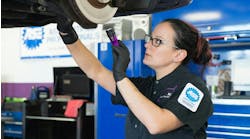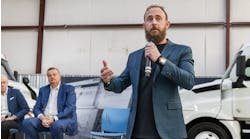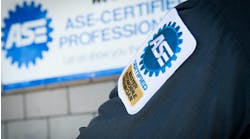Overachievers drive everyone else to try a little harder and pay a little bit more attention to detail. In an industry where mistakes can cost lives, they are nothing short of indispensable. That’s why we created the Fleet Maintenance Overachiever Awards as a recognition program to remind everyone of that fact and to honor everyone in the industry who does their job the right way because it’s the right thing to do.
After putting out a call for nominations, we received dozens of submissions, which were reviewed by our judging panel. Dewey Bishop was an easy choice in the Mentorship category for myriad reasons, which ranged from his eagle eye that can spot errors in technical manuals to innovative ways of using video to help train Ozark Motor Lines technicians. Here's his story:
Dewey Bishop | “The Mentor”
Fleet Technical Trainer | Ozark Motor Lines
For the last 15 years, Dewey Bishop has been in charge of training Ozark Motor Lines’ 68 technicians, providing them instruction on everything from general maintenance and repairs to working on newly adopted technology such as tire pressure monitoring systems and collision mitigation. Surprisingly, he taught himself how to work on cars and trucks.
“I’ve never been to actual school for any of it,” Bishop admitted. “I sit down and read manuals.” He also learned simply by doing, starting with the rebuild of a 1966 Chevy Chevelle 350 V8 engine at age 16.
Bishop said he was hooked on the trade once he saw “mechanically how everything functioned, how it was connected, and how one piece was required for the next piece to function properly.”
That was in 1988, and he hasn’t stopped since. For the last 17 years he’s worked for Ozark, a fleet that mostly runs in the Southeastern state. Bishop has attended several OEM training sessions to stay up to date on changes to the equipment. That, to Bishop, is a critical piece to avoiding downtime.
“From my experience, this industry changes daily,” he said. “And if you don’t stay on top of [those changes], you’re gonna get left behind. That’s the point I’m trying to get across to all of our techs.”
In addition, Bishop stresses that Ozark’s maintenance team takes pride in their work and never takes shortcuts. “It’s not how fast something can be repaired, but how long the repair will last,” he offered.
Another adage Bishop passes down: “If we don’t have the time to fix it right now, when are we gonna have the time to fix it again?”
Because Bishop’s nose is always in a manual or company maintenance report, he has caught issues that not only improved Ozark’s efficiency but also the industry at large.
In one case, Bishop noticed that the fleet was going through an excessive amount of steering axle brackets that supported the ABS cable. The technicians would always replace the bracket before any damage was done, but labor and parts aren’t free. So Bishop pressed the issue with the OEM, which then had engineering redesign the piece.
“I always call it the ‘Dewey bracket,’ because had he not said anything about it, then [the OEM] would have continued to use that same bracket,” explained Wayne Skinner, Ozark’s VP of fleet maintenance.
Bishop’s eagle eyes were put to good use when recurring differential leaks started to mount across the Memphis-based fleet. He confirmed the technicians were following OEM repair guidelines, and bolts were tightened to OEM specifications. But the investigation was not done yet, as Bishop then checked previous torque values and saw they were previously higher. He again addressed this with the OEM’s representative to get the value increased.
“Any fleet that uses that repair procedure is able to benefit from these updates,” Skinner noted. Aside from chasing down issues on older equipment, Bishop must also prepare Ozark’s five shops for new technology. In an effort to decrease tire maintenance costs, Ozark adopted Bendix SmartTire TPMS this year. Along with setting up training visits from the OE, Bishop created internal training videos using a GoPro camera.
Skinner noted Bishop will also create videos whenever he discovers reliability issues. “That helps get information out to our outlying shops, as well as here in Memphis,” Skinner said. The Memphis home base has specific shops for trucks, tires, trailers, body work, and detailing, all of which Ozark uses to diversify its apprentices’ skill set through five phases. Bishop oversees the 52-week program, with a target of getting three to four techs through each year. “We’re trying to build the best truck technician possible,” Bishop said. As no surprise, he says the best techs have an innate “curiosity about how it functions or why it functions.”
That was a self-taught lesson, too.




